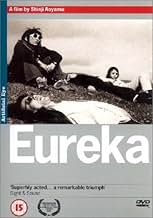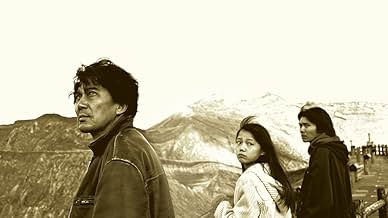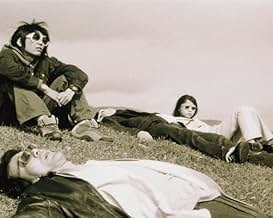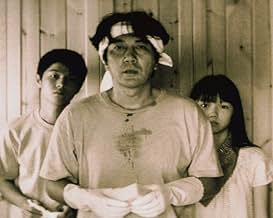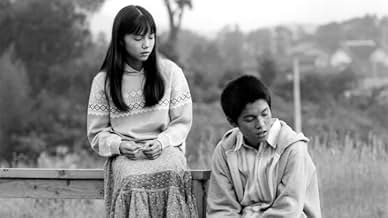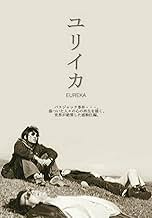AVALIAÇÃO DA IMDb
7,7/10
4,5 mil
SUA AVALIAÇÃO
Sobreviventes traumatizados de um sequestro de ônibus se reúnem e embarcam em uma viagem pela estrada para tentar superar o evento. Enquanto isso, um assassino em série está solto.Sobreviventes traumatizados de um sequestro de ônibus se reúnem e embarcam em uma viagem pela estrada para tentar superar o evento. Enquanto isso, um assassino em série está solto.Sobreviventes traumatizados de um sequestro de ônibus se reúnem e embarcam em uma viagem pela estrada para tentar superar o evento. Enquanto isso, um assassino em série está solto.
- Prêmios
- 4 vitórias e 2 indicações no total
Avaliações em destaque
10x-miner
I've seen EUREKA yesterday, and I really am impressed.
Along with those beautiful and sophisticated pictures in coloured black-and-white comes a great story; the movie takes both its time to roll out the plot and portrait the main characters. Each single scene is valuable, worth to be seen, contributes a lot to the whole, EUREKA is --despite its sheer enormity-- concentrated on the essentials and thus compact... and: the characters are authentic.
What else can I say? Go, see and feel it!
Along with those beautiful and sophisticated pictures in coloured black-and-white comes a great story; the movie takes both its time to roll out the plot and portrait the main characters. Each single scene is valuable, worth to be seen, contributes a lot to the whole, EUREKA is --despite its sheer enormity-- concentrated on the essentials and thus compact... and: the characters are authentic.
What else can I say? Go, see and feel it!
Hailed as a masterpiece by some, and a near one by others, I liked it quite a bit, and never felt bored in spite of it's nearly 4 hour running time. I was quite moved – to the point of tears - by the end.
It looks and feels like no other movie I've seen, shot in a shifting sepia tone, with very little dialogue, and long silent takes. It's an intimate epic. Sort of a Japanese version of a Terrence Malick film.
A young brother and sister, and a bus driver are the only survivors of a random bus-jacking by a madman. The three retreat from the world. But two years later the bus driver seeks out the brother and sister – living alone and mute despite their youth – and the long, slow process of healing begins.
As much as I liked a lot of it, certain plot twists felt clunky or heavy handed, as did some of the dialogue. A movie so based in unspoken emotion loses something when the themes suddenly become too literal, in word or action. But, those are things that might bother me less on a second viewing, when I was more prepared for this unique, odd, challenging film.
It looks and feels like no other movie I've seen, shot in a shifting sepia tone, with very little dialogue, and long silent takes. It's an intimate epic. Sort of a Japanese version of a Terrence Malick film.
A young brother and sister, and a bus driver are the only survivors of a random bus-jacking by a madman. The three retreat from the world. But two years later the bus driver seeks out the brother and sister – living alone and mute despite their youth – and the long, slow process of healing begins.
As much as I liked a lot of it, certain plot twists felt clunky or heavy handed, as did some of the dialogue. A movie so based in unspoken emotion loses something when the themes suddenly become too literal, in word or action. But, those are things that might bother me less on a second viewing, when I was more prepared for this unique, odd, challenging film.
It has been almost 6 years since I saw this film, yet this film can stick with me and still offer me things.
After a tragic incident of violence, a bus driver tries to find two other teen-aged survivors, a brother and sister. The sparse black and white camera work provide an insight into the bleak emotional landscape as they just stumble through as "walking dead". Having lost a father, I can identify with the characters. What is touching is the lack of communication and dialogue between the actors (whic includes the lead of the Japanese "Shall We Dance" ). Yet there is love and communication made even by just the thumping on bus walls. Words fail them.
The camera work is bleak yet stunning in composition and texture. Minimal yet just enough to feel the principals trying to find meaning in life. One can also speak of the Japanese economic downturn and the resulting introspective dramatic films such as Hirokazu's "After Life". If have experienced grief or if you'd like to find some insight into it, this may be a film. It seemed shorter than the four hours, but you are forewarned.
After a tragic incident of violence, a bus driver tries to find two other teen-aged survivors, a brother and sister. The sparse black and white camera work provide an insight into the bleak emotional landscape as they just stumble through as "walking dead". Having lost a father, I can identify with the characters. What is touching is the lack of communication and dialogue between the actors (whic includes the lead of the Japanese "Shall We Dance" ). Yet there is love and communication made even by just the thumping on bus walls. Words fail them.
The camera work is bleak yet stunning in composition and texture. Minimal yet just enough to feel the principals trying to find meaning in life. One can also speak of the Japanese economic downturn and the resulting introspective dramatic films such as Hirokazu's "After Life". If have experienced grief or if you'd like to find some insight into it, this may be a film. It seemed shorter than the four hours, but you are forewarned.
10gmwhite
I wouldn't give many films a score of ten unless they were truly outstanding, not just better, but in a whole different league. It is a grade reserved for the likes of (if I may indulge in a little subjectivity) Tarkovsky's Stalker;, Kitano's Hana-Bi, In the Mood for Love' by Wong Kar-wai, Dreyer's Passion of Joan of Arc, Ozu's Tokyo Story; and very few others. It is more than mere technical brilliance, top-class acting, superb plot or camera-work. What each of these films possesses is sheer humanity, simultaneously painful and life-affirming.
Eureka deserves to stand proudly in such company, for Eureka is a film that is so human it makes most others seem either shallow, over-wrought, or just pretentious. Eureka's plot is a simple, its action, dialog and soundtrack is sparse, camera movement is minimal. The sepia-toned photography is indeed a marvel to look at, and each of the actors performs with such restrained naturalness that they don't seem like performances at all. The result is a film that is less like a story being told, and more like an experience that is undergone or a journey shared. If there is any 'art' involved, it is in producing a film so fragile, yet so accessible, so desperately and painfully human out of material so grueling and alien to most of us fortunate viewers. And in this respect, the movement of Eureka mirrors that of the protagonists, the three traumatised survivors of a bloody bus high-jacking. They are a brother and sister,and the bus driver himself. In the wake of the tragedy, after some months of wandering and inactivity, they are drawn back together and set out on a bus.
As may be gathered, this film is very much about the aftermath of tragedy, about how certain experiences may mark one off from the rest of society, and how with silence, stillness and human company, and most importantly, the passing of time, some form of healing may be glimpsed. And it is just a glimpse. Though the final scene is indeed moving, there is no big payoff, anymore than there might be in life itself. There is only the artistry of the film itself to transfigure the story, and it does this with such quiet, unobtrusive sympathy, that to call it 'artistry' seems almost to malign it. I haven't seen Aoyama's other films, so I can't say whether he is destined for a Tarkovsky-, Dreyer- or Ozu-like elevation to the cinematic pantheon, but this film is a refreshing example of the kind of deep humanity of the best directors, the best artists, one that marks a perfect 10 off from all the rest.
Eureka deserves to stand proudly in such company, for Eureka is a film that is so human it makes most others seem either shallow, over-wrought, or just pretentious. Eureka's plot is a simple, its action, dialog and soundtrack is sparse, camera movement is minimal. The sepia-toned photography is indeed a marvel to look at, and each of the actors performs with such restrained naturalness that they don't seem like performances at all. The result is a film that is less like a story being told, and more like an experience that is undergone or a journey shared. If there is any 'art' involved, it is in producing a film so fragile, yet so accessible, so desperately and painfully human out of material so grueling and alien to most of us fortunate viewers. And in this respect, the movement of Eureka mirrors that of the protagonists, the three traumatised survivors of a bloody bus high-jacking. They are a brother and sister,and the bus driver himself. In the wake of the tragedy, after some months of wandering and inactivity, they are drawn back together and set out on a bus.
As may be gathered, this film is very much about the aftermath of tragedy, about how certain experiences may mark one off from the rest of society, and how with silence, stillness and human company, and most importantly, the passing of time, some form of healing may be glimpsed. And it is just a glimpse. Though the final scene is indeed moving, there is no big payoff, anymore than there might be in life itself. There is only the artistry of the film itself to transfigure the story, and it does this with such quiet, unobtrusive sympathy, that to call it 'artistry' seems almost to malign it. I haven't seen Aoyama's other films, so I can't say whether he is destined for a Tarkovsky-, Dreyer- or Ozu-like elevation to the cinematic pantheon, but this film is a refreshing example of the kind of deep humanity of the best directors, the best artists, one that marks a perfect 10 off from all the rest.
the first thing i heard about this movie was that it would be a 3.5 hours long black and white movie with a minimum of dialogues. that was all i needed to know to impatiently anticipate seeing Eureka. it took a while and it only showed in three cinema's here in belgium, in one cinema each month for they had only one copy of the film, so when i heard it played i found myself lucky to finally see it with a showing rate of once a day only five days/week. a bit surprised but then again could've guessed not a lot of people where in the (very)small theatre. as for most movies i anxiously await i held my breath, but this one captured me from the start. ok, better said: after the first scene is over you get involved with the three survivors of the bus-jacking, the driver and two kids - who never speak again from that day on and seem to live on their own (no one seems to know what ever happened to their parents... which is great, i love certain things that aren't explained in the movies,). but now i give away more than i like when writing about movies (this thing about the parents isn't even that important to the story, hence the give-away of this detail) *also, note that i saw this movie in september 2001 and never found it again to see or buy (if anyone has it and wants to get rid of it...)* the film is split up in three major parts. the first describes the fall and 'resurrection' of the driver, the second focusses on the children and how the three meet up again and try to bring their lives back into balance, the last part takes you on a final road trip through the country in a bus turned camper as a final solution type of thing. the last seconds hold a nice little surprise! (k, not a big o' deal - allthough it has this particular distinct meaning,wich i found quite amusing! -and will b lost for 99% of the viewers- the meaning that is) i know the duration was a turn of for a lot of people and i guess i can understand why most find Eureka boooring, but people like that never ever see these things in their whole perspective. if this movie were to've been made more up-tempo'd, it would've lost it's charm toootally. stories like these won't be told just that easily, it has to be absorbed in it's entirety, so one can feel every emotion intended, also gives you a bit time to think about things as you see them unfold instead of afterwords when you have to recollect the whole movie (which i did anyway but hey) this is a must-see-movie when being a moviejunk (especially the anti-hollywood-cinemaniacs) are u an emotional type? with eyes for beauty? see it.
Você sabia?
- CuriosidadesThe brother and sister in the film are played by real life brother and sister Aoi Miyazaki and Masaru Miyazaki.
- Citações
Makoto Sawai: Do you think one can live only for others?
Principais escolhas
Faça login para avaliar e ver a lista de recomendações personalizadas
- How long is Eureka?Fornecido pela Alexa
Detalhes
- Data de lançamento
- Países de origem
- Centrais de atendimento oficiais
- Idioma
- Também conhecido como
- Eureka
- Empresas de produção
- Consulte mais créditos da empresa na IMDbPro
Bilheteria
- Faturamento bruto nos EUA e Canadá
- US$ 49.388
- Faturamento bruto mundial
- US$ 49.388
- Tempo de duração3 horas 37 minutos
- Cor
- Mixagem de som
- Proporção
- 2.35 : 1
Contribua para esta página
Sugerir uma alteração ou adicionar conteúdo ausente


